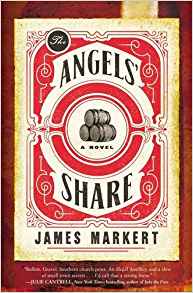This book was read and reviewed by guest commentator, Jennifer Campbell, one of my wonderful and fabulous sisters-in-law.
The Angels’ Share Book Review
By Jenn Campbell
It
has been said that death is so inconvenient. The McFee Family knows
this all too well. Prohibition led to the unexpected death of the family
business, the Old Sam Bourbon Distillery, which instigated the tragic
suicide of the elder Sam McFee. Then, when a mysterious accident results
in the death of young Henry, the dancing prodigy, the McFee family is
lost in a fog of unimaginable grief. All seems hopeless until the brutal
murder of a homeless vagrant. Who was this Asher Keating who lies
rotting in the grave in the potters’ field adjacent to the McFee
homestead? What are the twelve, pitiful followers who camp near his
grave hoping to prove? And why, for the love of all things supernatural,
are strange, wonderful things suddenly happening in this god-forsaken
town?
The Angels’ Share
by James Markert is set in a fictional, struggling town in Kentucky, in
the tumultuous 1930s during the Great Depression. The story is told
through the eyes of Johnny, the oldest son of Barley and Samantha McFee.
His own coming-of-age journey is woven throughout, with much emphasis
on the complexity and strength of family bonds, young love and the power
of believing in something bigger than yourself.
Markert’s excellent development of characters left me with no doubt that I, given the opportunity, could pick the primary and secondary characters of Angels’ Share
out of a crowd. No one was perfect. Everyone was broken. All were in
need of redemption, which propels the story forward as each character
recognizes their own need of healing. Also, even though I’ve never
tasted a lick of bourbon, I feel as if I have after
reading Markert’s delicious, colorful description of the masterfully,
crafted adult-beverage. I quickly learned what the “angels’ share” is
all about. I was also fascinated by the vivid imagery of days gone by,
including reintroducing words and phrases common during that era. I
appreciated Markert’s attention to background details that ultimately
make this tale a very informative piece of historical fiction.
In any good story, there’s usually a dash of romance. The Angels’ Share
is no different as Johnny’s crush on Polly, the beautiful girl who
believes Keating is Jesus Christ, intensifies with every encounter. I
enjoyed the progression, but felt Markert missed an opportunity to keep
it pure. For the most part, details were left to the imagination, but I
would suggest an older reading audience for this reason. Also, there is a
fine line between respecting the magic behind the extensive process of
bourbon making and remembering the tragedy that follows the abuse of any
kind of alcohol. While the negatives are fairly highlighted throughout
the book, there is also a bit of glamorization that may or may not be
unintentionally inviting to an unware reader.
Perhaps
the most challenging theme for me in the story was the comparison of
Asher Keating with Jesus Christ. I kept reminding myself that The Angels’ Share is a work of ficiton
in an ongoing effort not to be offended by the unsatisfying analogy. It
was hard to reconcile the flawed humanity of Keating with the flawless
God-Man, Jesus Christ. But, this is fiction. You can’t really reconcile
something that is “made up” for the purpose of entertaining the mind and
heart. And that’s ok. In the end, that’s what makes good fiction.
I give The Angels’ Share 4 out of 5 stars.
This book was provided by Fiction Guild and Tyndale House for review without compensation.


